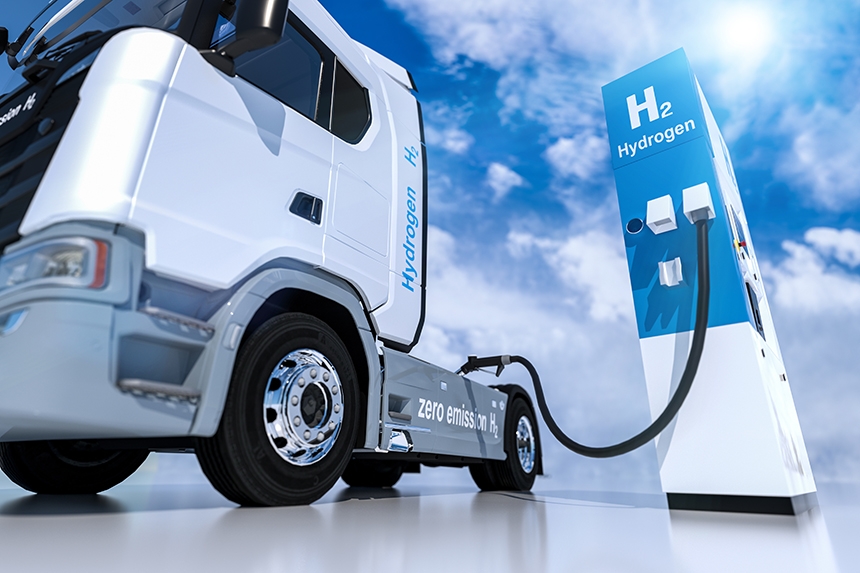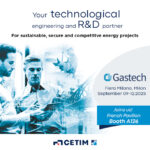It is now official! The European project to develop a new concept of hydrogen refuelling station is moving forward with H2Ref-Demo, a hydraulic compression demonstrator project to be led by Cetim.
Europe has once again placed its trust in the consortium led by Cetim and H2NOVA for the development of a ground breaking concept of hydrogen distribution station. As part of the H2Ref project (distribution of a cost effective and reliable hydrogen fuel cell vehicle refuelling system), a first functional prototype was presented on 27 February 2020. The next step is H2Ref-Demo, which further enhances and multiplies by 5 the innovative compression concept devised in the initial H2Ref project. The goal is to meet the refuelling needs of large vehicles requiring hydrogen distribution at rates of several hundred kg/h, such as refuelling a fleet of buses every evening at the depot, refuelling trucks or even trains. The H2Ref-Demo consortium is led by Cetim and brings together H2Nova, UTC, Hydac, HRS, UNIMORE and Faber.
A vital transition to hydrogen for heavy transport
It is believed that the switch from fossil fuels to hydrogen is essential to decarbonise heavy transport: the energy density of batteries is generally insufficient for the required amount of energy to be stored on board. This primarily applies to heavy goods vehicles, trains running on non-electrified lines and coaches (long-distance buses). In addition, as regards heavy road transport, the new European regulations, which call for a 30% reduction in CO2 emissions from new heavy goods vehicles at fleet level by 2030, will result in the introduction of hydrogen power trains. Under the EU directives and according to recent projections by 2030: 60,000 hydrogen powered trucks could be in service in the EU, 2,000 hydrogen refuelling stations will be needed with a requirement for hydrogen refuelling stations with a hydrogen capacity of at least 2 t/d along European highways. In other words, a total investment estimated at 7 billion euros. By 2050, hydrogen could power a European fleet of about 45 million passenger cars, 6.5 million light commercial vehicles, 250,000 buses and 1.7 million trucks.
Developing high-capacity hydrogen filling stations
The H2Ref-Demo project builds on the achievements of the previous H2Ref project which devised a disruptive solution based on the use of hydropneumatic accumulators for refuelling passenger vehicles (5 kg/vehicle, 30 kg/h). This new approach combines the high performance of hydraulic supply systems and carbon composite pressure tanks. It offers considerable benefits for high-capacity refuelling, with heavy transport requiring the distribution of 20 to 80 kg per vehicle.
To be specific, HRef-demo will develop and test, on a large scale, a high-capacity compression module that is able to compress hydrogen either for storage with a capacity of 1.2 T/d or for distribution at 350 Bar (150 Kg/h – 2.5 Kg/min). Once the system is fully optimised, it will be tested for one year in a refuelling station operated commercially on the HRS premises. This key milestone should allow the H2REF compression system to be marketed to fuelling station operators as hydrogen-powered truck fleets become available (and probably trains and buses as well).
Accelerating hydrogen mobility
The H2Ref-Demo consortium brings together three major European industrial players who are already world leaders in their respective fields: hydrogen refuelling solutions in the case of HRS; hydraulic power systems, hydraulic accumulators and high-pressure components for Hydac; and mass-produced pressure vessels for Faber.
At a broader level, H2Ref-Demo demonstrates Europe’s ability to develop and deliver breakthrough hydrogen refuelling solutions. It is aimed at overcoming a technological barrier and accelerating the spread of hydrogen mobility, which is essential to achieve decarbonisation of transport applications where batteries are not an ideal solution for onboard energy storage.
The H2Ref-Demo project is co-funded by the European Union’s “Horizon Europe” programme under the “Clean Hydrogen Partnership” (grant agreement No. 101101517). www.h2ref.eu/




